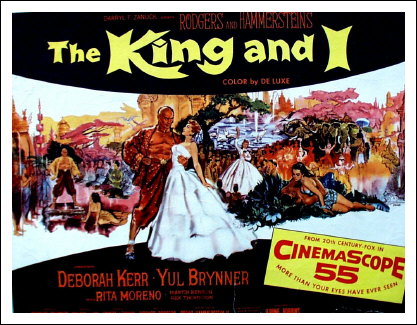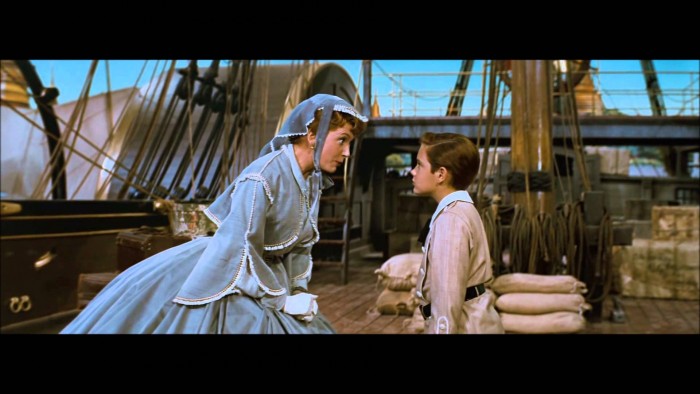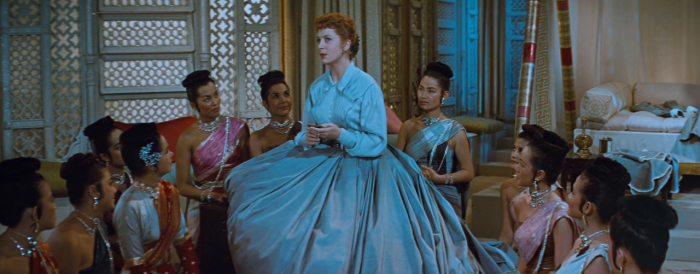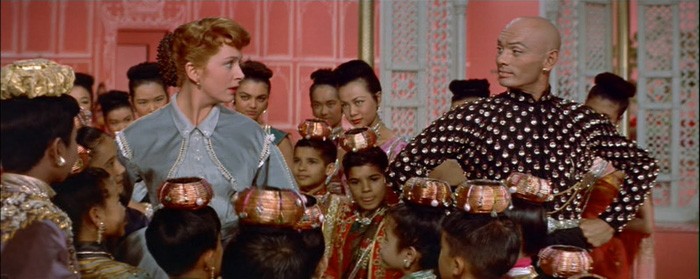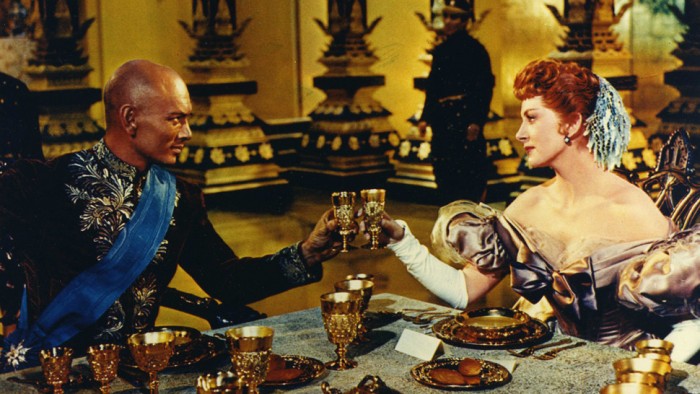Deborah Kerr and Yul Brynner lit up the technicolor screen in the 1956 Hollywood adaptation of a Broadway musical, The King and I. It won five Academy Awards with Brynner named Best Actor.
In 1862 Anna Owens, a widowed schoolteacher, moves from England to Siam (now Thailand) with her young son to tutor the king’s crown prince and his 66 other children (!). Suddenly slammed by culture shock, Anna tries to comfort her son with a song that says, “Whenever I’m afraid I whistle a happy tune and the happiness in the tune convinces me that I’m not afraid.” (If you’ve ever been really afraid, you’ve found this doesn’t work.)
Received at court, the genteel teacher immediately butts heads with the powerful ruler. She had been promised “a brick residence” outside the walls of the palace. However, she and her son are moved into the palace harem. She demands the king provide the house (a harem is no place for her son!)—or she will leave. Intrigued by anyone daring to defy him, the king agrees to the house but continually delays giving it to her. Maybe he wants to keep her in the palace to see her more often.
The film entertains while exposing the clash of two cultures. Brynner is a towering figure as the king. At times, he is a picture of strength with his resonant baritone voice, speaking and singing. His cross-armed, wide-legged stance, and fierce eyes provoke fear. Other times, he shows the inquisitiveness of a child, as well as a vulnerable heart. The pagan king controls life and death and his underlings, even his children, prostrate themselves before him. Despite their differences in station, the king becomes intrigued by the charming but “very difficult” foreign teacher.
Anna (with the beautiful singing voice of Marnie Nixon dubbed in for Deborah Kerr) comes from a country ruled by a gracious Christian queen, Victoria. Siam is nothing like England! Although the king’s personality and brilliance fascinate “Miss Anna,” she is appalled by his treatment of his subjects—especially his harem consisting of many slaves. Anna determines to help the volatile king see the error of his ways.
The king admires Anna’s knowledge of current affairs and is fascinated by science and geography. Besieged by colonial powers and Siamese traditionalists, he is torn between wanting a modern country and keeping Siam’s autocratic structure intact. She tactfully instructs him on everything from dancing to monogamous marriage customs of the West to why Abraham Lincoln isn’t using elephants to fight the Civil War. He wonders at some of the world’s ways and considers them, as well as Anna herself, a “puzzlement.”

One of the highlights is when, while they are alone, Anna teaches the king to dance. To “Shall We Dance?” they whirl around the ballroom with such energy and delight that viewers feel like dancing too (and watching at home, I have). This intelligent woman, both intrigued and irritated by this potentate, fights the realization that she is falling in love with him—knowing it would be an impossible match.
At a formal dinner for foreign dignitaries, the king shows off his knowledge, often ending proclamations with a wave of the hand and his new favorite phrase, “etcetera, etcetera, etcetera.” He charms his guests until the night’s entertainment, a Siamese ballet of Uncle Tom’s Cabin produced by a new wife, becomes an indictment of slavery—and him. The king watches as his guests, not understanding how offended he is, cheer the beauty of the production. The slave uses the entertainment to escape to be with the man she loves. The king sends armed guards after them, crushing Anna’s hopes that he might show mercy.
When I think of The King and I, I sometimes think of Esther, a Jew and one of only two women with biblical books named for them. Esther had a number of reasons to be afraid. She lived under an all-powerful king whose word was law and couldn’t be changed (“the law of the Medes and the Persians”). Although the Jews were a mostly free people in Persia at that time, anti-Semitism was alive and well as it always has been.
Esther’s uncle Mordecai had raised his beautiful niece after she was orphaned. Like any good father, he wanted her to have a secure life. When he heard the king was looking for a new wife, he asked her to be in the oriental competition from which the bride would be chosen. And, like any good daughter of that era, Esther obeyed. She moved into the palace harem, although that probably was the last place she wanted to be. This kind of contest was not like Miss America. Many women were kept in the harem for a year and given beauty treatments. But the king was the only judge, and he would judge both by beauty and by sleeping with each woman. For a faithful Jewish girl, this was NOT a dream come true. But God was with her, and she was chosen queen.
Later Mordecai discovered that one of the king’s advisors, Haman, was planning to have all the Jews in the country killed by tricking the king into signing an order. Mordecai told Queen Esther that God may have brought her to her position “for such a time as this” and that she must not fail her people (Esther 4:14). At first she argued that approaching the king without him calling for her was against the law and might cost her life. But realizing she was the only one who could help her people she agreed saying, “if I perish, I perish” (v. 16).
Despite her fear, Esther found a clever way to expose Haman and his plot to the king. This also meant admitting that she was a Jew—something the king had not known. Rather than turning on her for a perceived deception, in ironic justice the king had Haman hung on the same gallows that Haman had built to hang Mordecai on.
The story of Esther may seem more like a screenplay than The King and I (which was also based on a true story), but she is one of the heroes of the Old Testament. Although the name of God is found nowhere in the Book of Esther, His presence and divine providence is throughout it. Esther found that courage comes not from within you (or through whistling) but from above you through trusting. When Esther cared enough about others to forget herself, she was able to influence the king and save her people.
Esther was an un-empowered young woman God empowered to save His people. She was in the right place at the right time to do the right thing. And she did it. Like most of us, she was not a rich woman. There’s no indication she was highly educated; most women of that day couldn’t even read. At first glance, she seems to have had only one talent—she’s beautiful. (Also God-given.) But she used what God gave her to stand up for those who could not stand up for themselves.
By being courageous, Esther saved her people. In The King and I, Anna could make only a little headway with the stubborn king. Her real accomplishment is seen at the end when the crown prince, whom she tutored, begins to reign. He immediately stops his subjects from prostrating themselves. The future is changing because of her influence.
God can use women. He does use women. But the ones He uses aren’t necessarily powerful rulers like Queen Victoria of Anna’s era or even the wives of rulers, like Esther. More often he uses women who don’t seek power for themselves but help to influence the times in which they live. They use whatever gifts God has given them to help those who are being oppressed. In “such a time as this,” where the most oppressed are the aborted, the sex-trafficked, and those persecuted for their Christianity, we each have opportunities to speak up, to stand up. The question is: do we have the courage to be an Anna or an Esther and do it?
©2016 by Vicki Huffman
About Vicki Huffman
National award-winning journalist Vicki Huffman's latest book is Soon to Come: The Revelation of Jesus Christ. It is a verse by verse exposition of the only purely prophetical book in the New Testament. Her other five books are: The Jesus Moses Knew: How to See Christ in the Old Testament; A Secret Hope (novel); Still Looking: Finding the Peace of God in Job Loss; Plus Living: Looking for Joy in All the Right Places, and The Best of Times. All are available in print and e-book on amazon.com. Vicki is a national award-winning author who has taught the Bible for many years. She was an editor for several Christian publishing houses, including Thomas Nelson and David C. Cook Ministries.
- Web |
- More Posts(120)

